Jeep Wrangler vs Land Rover Defender comparison
Low range isn’t unheard of in high-end SUVs. It’s just that in a Jeep Wrangler and Land Rover Defender, it’s expected to be put to good use. We do just that.
Published on Sep 25, 2021 08:00:00 AM
49,275 Views
Follow us on
There’s no better antidote to a year of being cooped up at home than a trip to the great outdoors. And few vehicles are designed to take you as far out as the ones with us today. The Wrangler and Defender nameplates spell adventure and, even with all the modern amenities these new versions pack in, remain models truest to Jeep and Land Rover’s go-anywhere ethos.
Our little adventure starts in Mumbai with the headline event at the Learn Offroad Academy’s training grounds in Pali, some 120km away. Spread over 65 acres, it’s a place to hone serious skills and, at this time of the year, is an absolute no-go for two-wheel-drive vehicles. The grass is slippery, the paths leading to obstacles have become slushy obstacles themselves and, for added effect, it’s pouring buckets. Dr Tejas Kothari of Learn Offroad is on the walkie to guide me on the course and our own mud madman Rahul Kakar is my spotter for the day – any dings on the Jeep or Land Rover are on him. Time to get dirty!
Defender Of The Faith
With the slushy surface set to deteriorate over the day, we decide it’s best the Defender head out first. It’s on all-terrain rather than off-road tyres and seems like it could be the underdog today. Monocoque construction and all-independent suspension don’t scream ‘World-conquering Off-roader’, do they? The reality is very different, as I learn shortly.
| Land Rover Defender Price, Mileage, Specifications, Features and Variants | |
|---|---|
| Brand | Land Rover |
| Model Name | Defender |
| Land Rover Defender Price | ₹ 1.20 - 3.22 crore |
| Land Rover Defender Range/Mileage | NA |
| Land Rover Defender Specifications | SUV | 5 doors | 8 seats View All Specs |
| Land Rover Defender Features | Matrix LED headlight | 11.4-inch Touchscreen display | 6 airbags View All Features |
| Land Rover Defender Variants | 110 X Dynamic HSE P300 2.0 Petrol | 90 X Dynamic HSE D350 3.0 Diesel | 110 X Dynamic HSE D350 3.0 Diesel View All Variants |
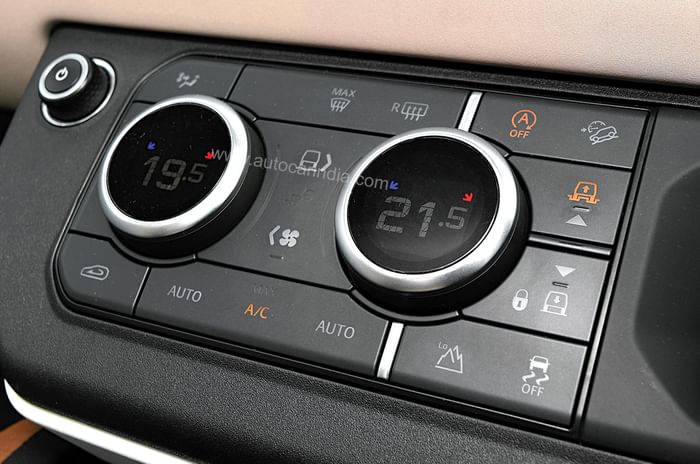
Like an Olympic athlete, the Defender has its own pre-game ritual. Selecting Low Range via a button on the centre console primes the Land Rover for serious action, and almost as a statement of intent, the air suspension also extends to max off-road height that gives an added 75mm of ground clearance, taking it to a mountainous 291mm, and also enhances approach, breakover and departure angles. The elevated height adds to my confidence, and I also gladly outsource the job of working out the off-road settings to the Defender’s electronic brain. The Terrain Response 2 off-road suite features an ‘Auto’ programme that constantly reads the conditions and alters the throttle, gearbox, 4x4, centre and rear diffs, steering and traction control characteristics accordingly.
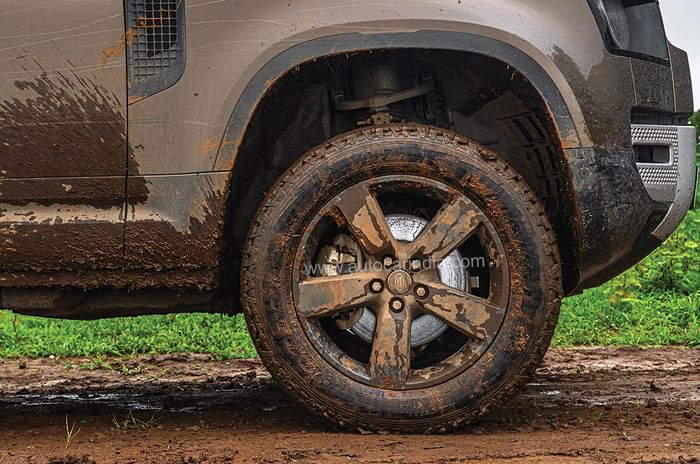
The Defender makes the water pit at the start of the course seem like a leisurely dip. It’s an easy crawl down the steep slope and even the knee-high water is dispatched as if it were a puddle. Land Rover says the Defender can wade through an incredible 900mm of water – an ability that, in reality, will find more use on waterlogged city roads than an off-road course. The steep exit is clean and graceful, a carpet of jagged rocks is up next, and while Rahul takes position I get a good look at it via the touchscreen. The multiple cameras present a brilliant, 360-degree augmented-reality image of the SUV in its surroundings, and there’s even an under-bonnet view to tell me what lies beneath.
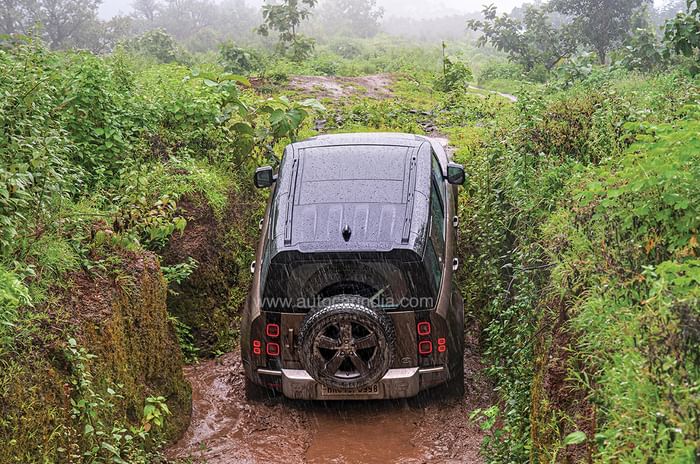
The Defender makes light work of the rocky path and it’s quickly on to a slightly intimidating hump akin to a giant muddy speedbreaker set at an angle. A slow crawl up, weight transfer at the summit and a slow crawl down are what’s expected; my only job is to keep the steering straight. The Defender climbs with confidence and the front left wheel lifts off the ground on cue at the top, but just as it’s about to tip back down onto its front, the Land Rover slides sideways along the hump. Heart in mouth, I’m reassured by a thumbs-up from Rahul that the Defender’s intact. The all-terrain tyres (ironically called Goodyear Wranglers!) just couldn’t find a firm enough footing on the slithery surface. The first part of the course ends with a slow hop over a series of pipes.
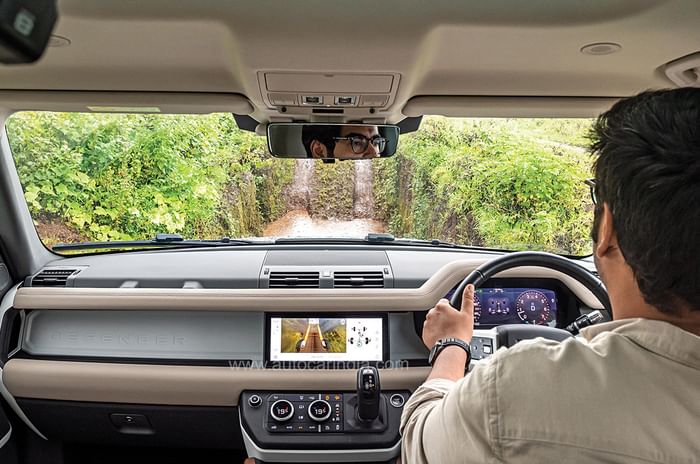
Things get even trickier as we proceed. Up ahead are deep ruts leading up a gentle slope, and from my vantage point, the uneven track and high verge are not a pretty sight. Rahul, to my surprise, gives me the all clear. I’m mentally prepared to hear the painful sound of the underbody scraping the surface, but remarkably, the Defender doesn’t ground at any point. The slow ascent is violent, with the Defender slamming from side to side, its tyres searching for grip. I can hear the electronics clicking away in the background trying to make the best of the conditions, and it does make it through. Special mention must go to the suspension, which offers far more travel than you’d expect.
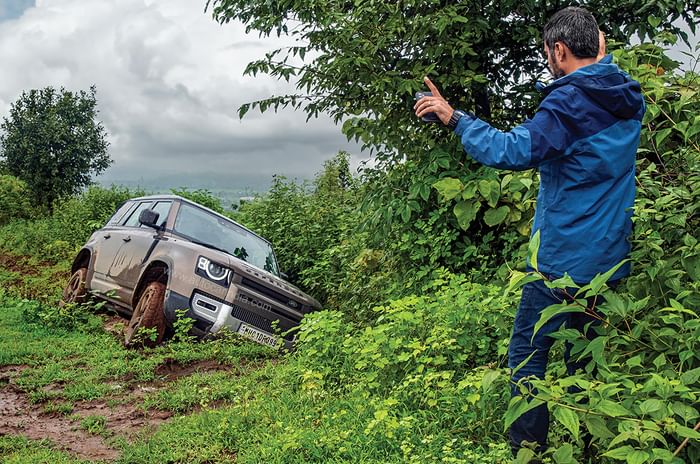
The last challenge is a sideways slope that seemingly leads to a dead end. Except it doesn’t. A sharp uphill right turn is the path to freedom and powering out hard is the only way through. It’s easy going in, but at max incline, the Defender’s off-road screen shows a roll angle of 28 degrees. It feels truly unnatural to drive with the horizon so tilted and I wish I’d gone easy on breakfast. The Defender can lean as much as 45 degrees, but I’d rather work my way out of this obstacle before that gets put to the test. And that’s where it gets tough. I don’t have the pace to make the exit in Attempt 1. On Attempt 2, the front tyres make it out but the rear ones can’t quite hook up. I almost make it out on Attempt 3. There’s lots of wheelspin and just when it seems the tyres are biting, the engine frustratingly starts cutting revs, which is said to be a peculiarity of petrol Defenders (more on the engine in a bit). More speed, frantic lock-to-lock steering in the hope the front tyres will anchor themselves to the wet grass, and lots of drama later, the Defender pulls itself out.
Would it have fared better with more appropriate footwear? Absolutely. But even as is, the Land Rover has managed some serious mud plugging. That initial scepticism sure proved unfounded.
Jeep Thrills
With its body-on-frame construction, solid axles and BF Goodrich mud-terrain (M/T) tyres, the Wrangler, in hardcore Rubicon guise, promises a very different experience. Switching over from the Defender is a culture shock in itself. Forget niceties like Access Height (the Defender lowers by 50mm to ease entry), the Wrangler doesn’t even feature footboards. The grab bar at the A-pillar isn’t for show; you really do have to haul your way in. Inside too, the vibe is of being in a place for serious business. There’s a good old-fashioned lever for four-wheel drive, and the front and rear diff locks are operated via a physical toggle too. It feels analogue and I can’t say I don’t like it.
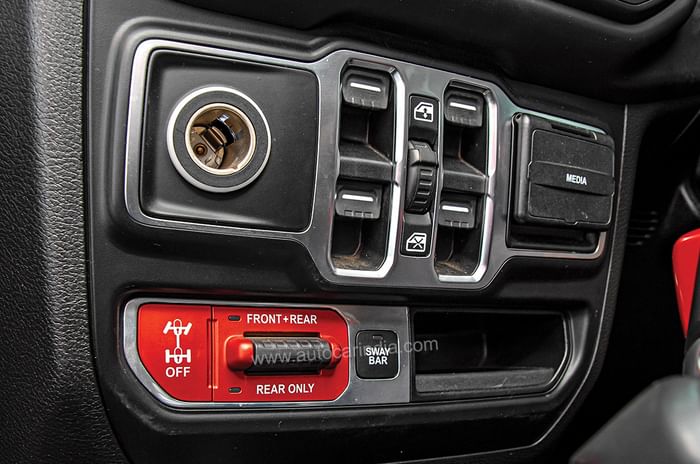
4-Low engaged – it’s go time! The steep descent into the water pit is a measured one and the incredible 77.2:1 crawl ratio keeps a check on speed. A cool bit of trivia is that the Wrangler’s hill-descent control can be set to as low as 1kph! Best not to test this now though, because going too slow on this surface will lock the wheels and make the Wrangler slide down. The water level isn’t a challenge thanks to a wading limit of 760mm, and the climb out of the pit is easy too. The rocky path feels no harder than rolling over pebbles and the sideways hump goes as planned too. The Wrangler climbs confidently and, unlike the Defender, holds its ground even during the slow tai chi of weight transfer from rear right to front left. The tyres seemingly have less ‘air time’, pointing to greater articulation, but just as I think the Wrangler is walking away with it, there’s a loud CLANG from the underbody. The unassuming horizontal pipes at the exit have made contact with the frame and have rudely reminded me how 39mm less clearance (252mm versus 291mm) can make a world of a difference in the wild. A quick spec check reveals the Wrangler also trails a fully raised Defender on approach angle (36 degree vs 38 degree), breakover angle (20.8 degree vs 28 degree) and departure angle (31.4 degre vs 40 degree).
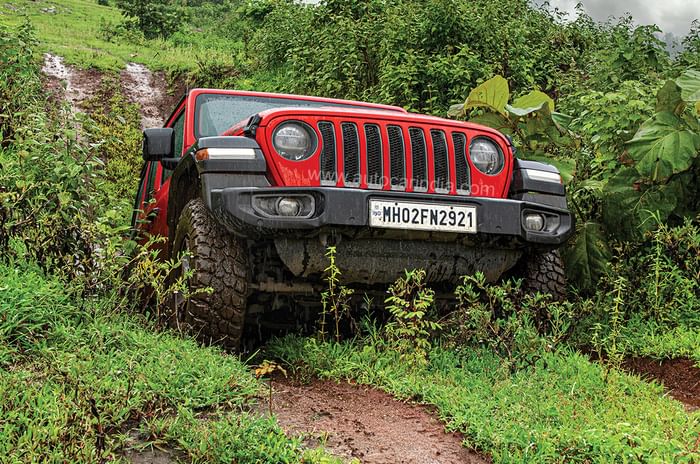
The Wrangler Rubicon, however, absolutely aces the mud rut. Those specialised tyres come into play here, clawing through the path, and the option to disconnect the front anti-roll bar at the touch of a button just unlocks a new level of ability. The Wrangler feels surefooted throughout the rut and on seeing the photos later, I know why. There’s so much wheel travel, front and rear, that the Wrangler stays planted at all times. I also don’t need to work its engine half as hard as the Defender’s in the same setting. The Wrangler is unfazed by the side incline too; it chugs along and clambers out of the steep path as if it were a very routine activity. The rear tyres do dig in, but momentum is maintained and its mission accomplished.
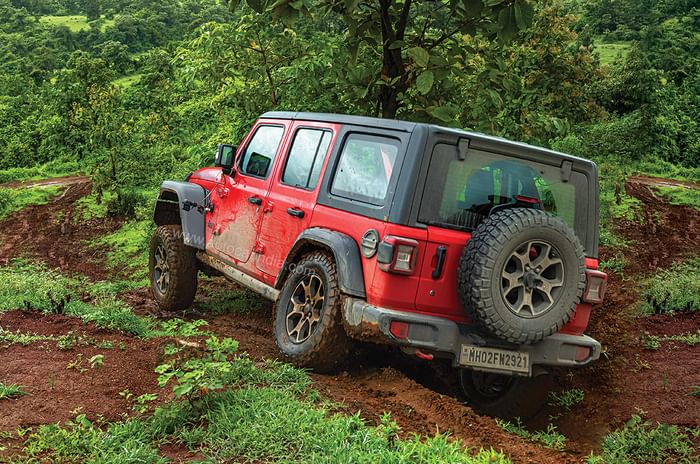
Road Tripper
I start the journey back to Mumbai in the Wrangler, and quickly enough, I can feel the very elements that made it an off-road hero start working against it. There’s a constant roar from the M/T tyres on the concrete surface, the steering is slow, handling is lazy, the ride is typical body-on-frame lumpy and, on its solid axles, it pounds through potholes too. It feels indestructible, no doubt, and isn’t fazed by broken patches of road, but the Jeep also can’t quite hide that it’s an off-roader first.
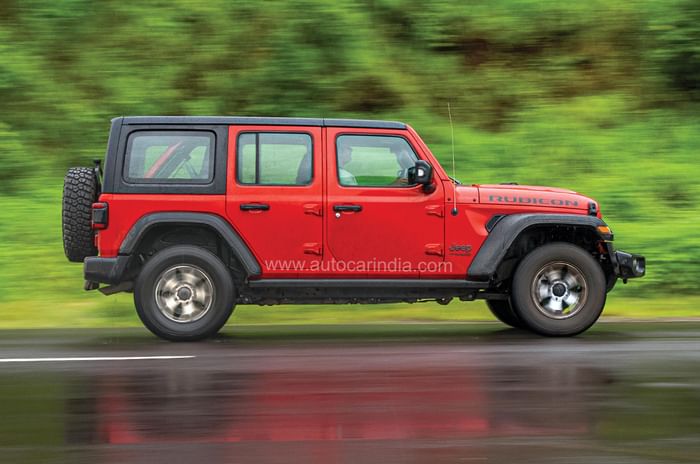
The Wrangler’s relatively small 2.0-litre four-cylinder petrol engine (the only engine on offer in India) is, however, far nicer than you’d expect. There’s a steady stream of power, and when you want more, the 268hp, 400Nm engine delivers. There is a moment’s hesitation from the 8-speed auto, but it’s followed by a satisfying surge.

As for the Jeep’s interior, it’s best described as functional rather than fancy. It’s neat, looks built for hard use and the key controls are in easy reach. If you like to sprawl out, however, the narrow footwell will be an irritant. The list of frills is really small by luxury SUV standards (the seats aren’t powered, for one) but who needs a sunroof when you can remove the entire roof (and doors, for that matter)?
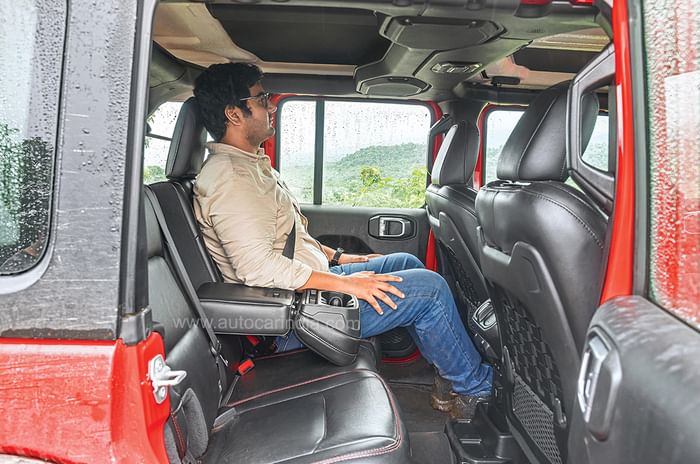
It doesn’t get more panoramic than that! The rear seat is roomy enough for three, though the low and flat seat isn’t quite what bade sahib will like.
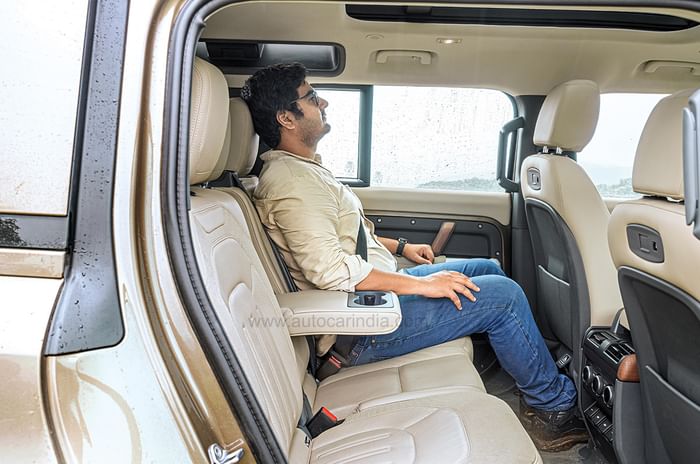
The Defender has the comfier rear seat and its interior generally fits the image of a luxury SUV. The materials are rich, it looks thoroughly modern and it’s also got the latest tech, including configurable digital dials, a large touchscreen and even a rear-view mirror that turns into a camera feed display. It’s also thoughtfully designed, with loads of stowage for small items and USB charging outlets to juice up multiple devices at a time. There’s the option of a third row too, but seating at the very back is cramped.
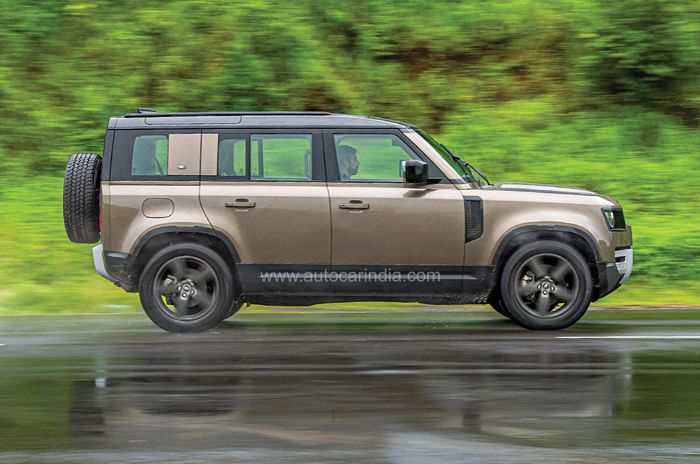
It doesn’t take much driving to cement the Defender as the comfier SUV on the road. The overall refinement level is leagues above the Wrangler’s and the absorbent suspension does a better job of cocooning you from what’s happening underneath. It’s no sportscar but handling is neat for what is a large, heavy and tall SUV. Also nice is the Defender’s 300hp, 2.0-litre, four-cylinder petrol engine. It’s not forceful, but the linear delivery is likable. Unlike with the Jeep, however, should you want more power, the Defender comes with the option of six-cylinder petrol and diesel engines too.
| Specifications | ||
|---|---|---|
| Jeep Wrangler Rubicon | Land Rover Defender P300 SE | |
| Length | 4882mm | 5018mm |
| Width | 1894mm | 2008mm |
| Height | 1901mm | 1969mm |
| Wheelbase | 3008mm | 3022mm |
| Ground Clearance | 252mm | 291mm |
| Weight | 2109kg | 2243kg |
| Tyres | 255/75 R17 | 255/60 R20 |
| Approach angle | 36deg | 38deg |
| Breakover angle | 20.8deg | 28deg |
| Departure angle | 31.4deg | 40deg |
| Max wading depth | 760mm | 900mm |
| Suspension (f/r) | Non-independent, 5-link, coil springs | Independent, double wishbone, air springs/ independent, integral link, air springs |
| Engine | 4 cyls, 1995cc, turbo-petrol | 4 cyls, 1997cc, turbo-petrol |
| Power | 268hp at 5250rpm | 300hp at 5500rpm |
| Torque | 400Nm at 3000rpm | 400Nm at 1500-4 |
| Gearbox | 8-speed auto | 8-speed auto |
The Incredibles
If there’s one thing our rain-drenched adventure has made clear as day, it’s that the Wrangler is the more focused off-roader while the Defender is the more accomplished all-rounder. The Rs 57.9 lakh (ex-showroom) Wrangler Rubicon is the one you’d want if hardcore off-roading is a big part of your calendar. It’s got the edge in the rough, but what really endears the Wrangler is that you remain an active part of the experience. There’s no electronics safety net to fall back on and it’s on you to make the most of its hardware. You’ll also find yourself taking more liberties with it, and it will take a beating. In the posher Defender, you’ll be more risk averse, which also limits how much fun you can have off road.
The Defender is more novice-friendly in the rough and, in skilled hands, at least 80 percent as good as a Wrangler. Slap on the right tyres and the gap reduces further. In every other setting, the Defender trumps the Jeep. It’s comfier, quieter and has all the trappings of a luxury SUV. There’s a good Rs 30 lakh premium to pay for a Defender P300 SE, but the significantly higher outlay also gets you the one SUV that really does it all.
| Verdict | ||
|---|---|---|
| Jeep Wrangler Rubicon | Land Rover Defender P300 SE | |
| Price (ex-showroom, India) | Rs 57.9 lakh | Rs 89.64 lakh |
| Rating | 7/10 | 9/10 [OUR CHOICE] |
| Verdict | Incredible off road and undeniably cool, but not for typical luxury buyers. | Talented off-road and capable on it, it’s a great all-rounder albeit a pricey one. |
What About The G?
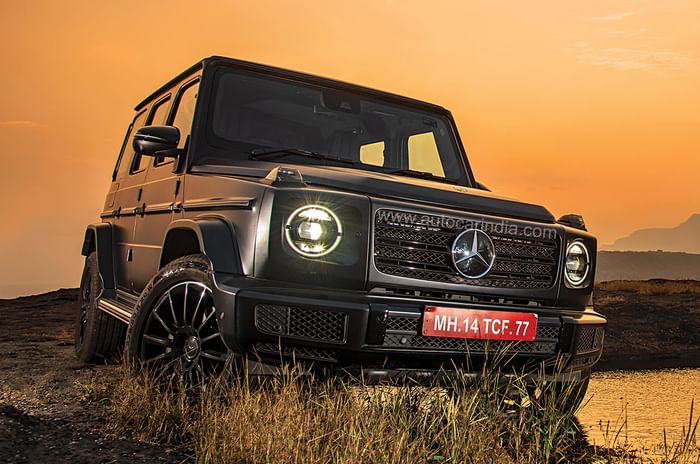
The Mercedes-Benz G-Class would have completed our trio of legends, so it’s a pity Merc couldn’t arrange one for the shoot. Salient points include a tank-like build and a properly modern Mercedes cabin with lots of tech. It’s closer to the Wrangler in format, with body-on-frame construction and coil springs all around, though the latest one uses an independent front suspension. Ground clearance, approach and departure angles are less than on the others but the G is handy in the rough and boasts of front, centre and rear diff locks. It’s available in India in two flavours – the (relatively) sensible G 350d diesel and the wild AMG G 63. Iconic as it is, the G is also unduly expensive. The range starts at Rs 1.64 crore while the AMG is Rs 2.4 crores onwards!
Copyright (c) Autocar India. All rights reserved.

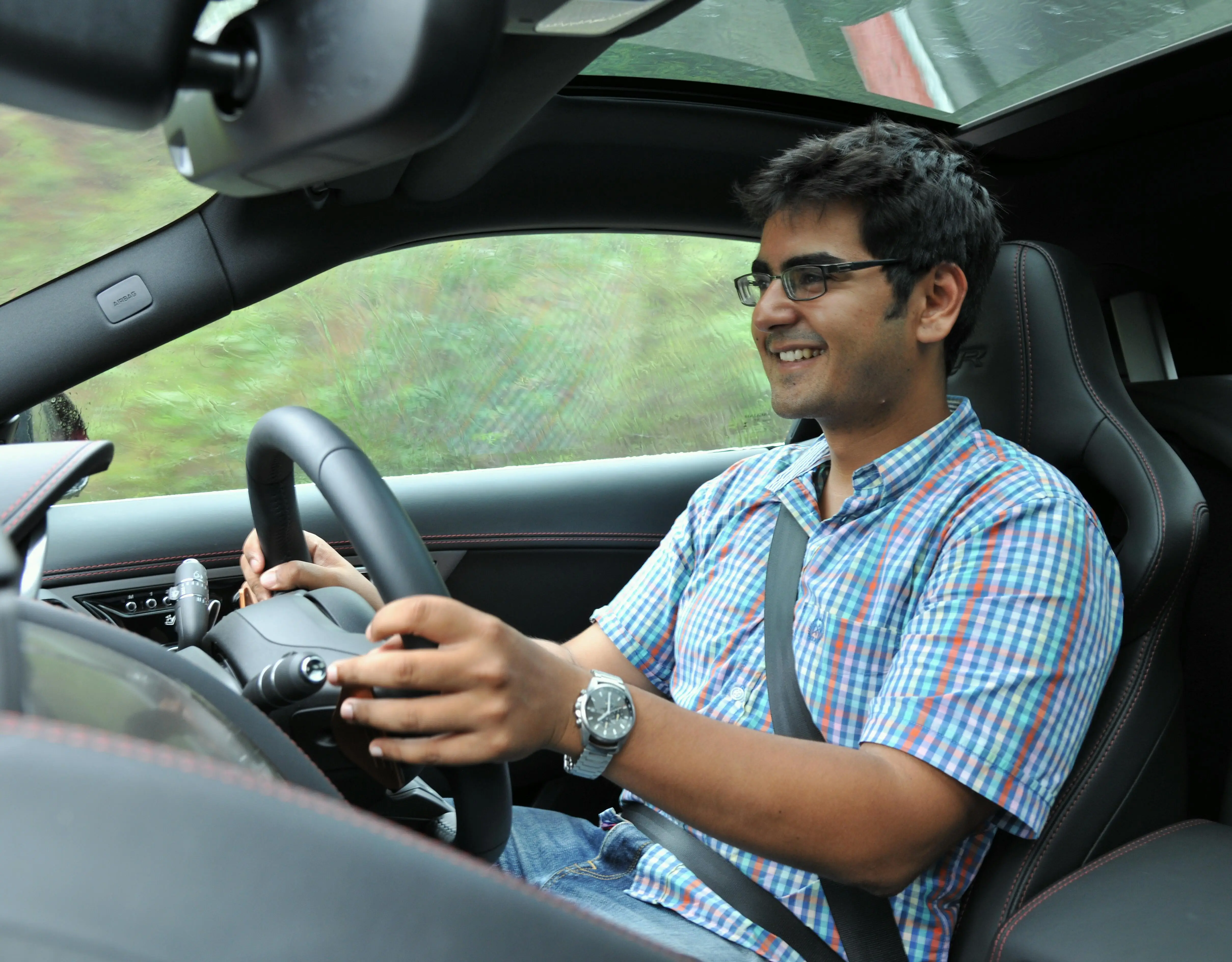
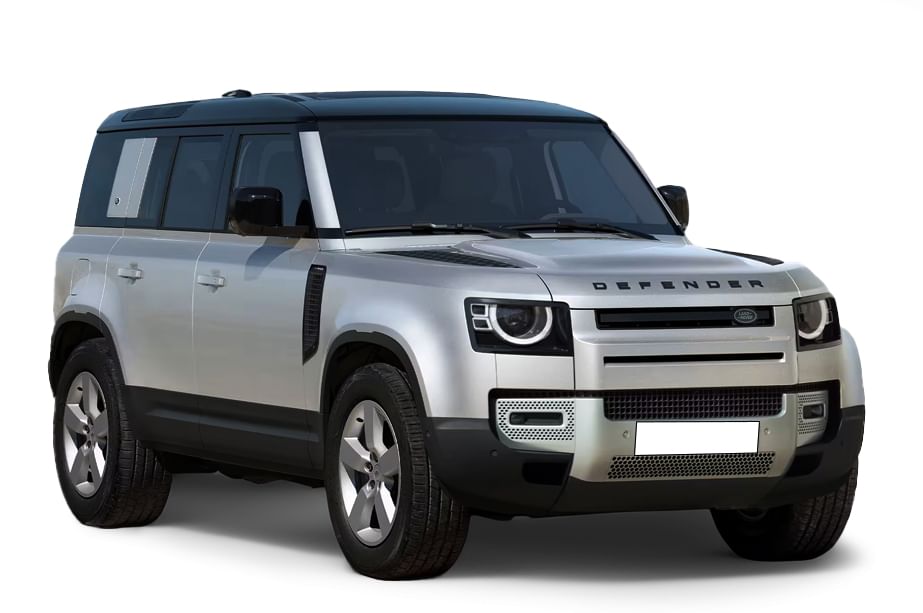







Comments
Member Login
Personal Details
No comments yet. Be the first to comment.